- Home
- P. D. James
Innocent Blood Page 5
Innocent Blood Read online
Page 5
Philippa stared at Hilda, disconcerted by this unexpected percipience. She cried: “But I want it to touch me! I want to feel it!”
She thought: “It’s because I don’t really believe it yet. All my past is fabrication. This is just a new story, a different angle, to be explored and experienced. Then I shall return to the reality I fabricated for myself, to that unknown father striding across the lawn at Pennington. It is these newcomers, not he, who are the usurpers.”
Hilda was rinsing out the floor-cloth under the tap, muttering above the splash of the water.
“When you came in just now—you knew what you were going to say. I expect you practised it in the train. But you aren’t really unhappy. You’re not as unhappy as you would have been if you hadn’t got your Cambridge scholarship. You’re like your father, neither of you can bear to fail.”
“You mean I’m like Maurice. I don’t know whether I’m like my father. That’s one of the things I mean to find out.”
“It was Parliament, that Act they passed. They had no right. It was breaking faith with adopters. When we took you on we thought that you’d never be able to find out who your parents were.”
“Took you on.” Was that how Hilda had always seen her, as an obligation, a responsibility, a burden? Probably Hilda had never really wanted her. Why should she? A baby adopted from birth, pitiful, dependent, responsive, might have done something for Hilda’s frustrated maternal feelings. But what satisfaction could she have expected from a difficult and resentful eight-year-old whose parents had suddenly been taken from her, had disappeared without explanation? No, it had been Maurice’s doing. Maurice had demanded his experimental material. But the idea of adoption must have been Hilda’s. She must have been the one who had originally agitated for a child. Maurice wouldn’t have cared one way or the other. But if there had to be an adopted child to satisfy Hilda’s thwarted maternal instinct, then he would at least ensure that they chose one with intelligence but from the worst possible background. If he couldn’t have a child of his own, at least he could rear one for the glory of sociological theory. It was surprising that he hadn’t selected a second female, carefully matched for age and intelligence, to monitor their joint progress. After all, every experiment needed a control. How he and Hilda must have enjoyed their secret! Was this what had kept their odd marriage intact, the titillating confederacy of deceit?
She said: “I could have applied to a court for permission to see my birth certificate once I came of age. That’s always been the law, even if people didn’t realize it.”
“But you wouldn’t have done that, and if you had, at least we’d have been warned. Then we could have told the court and the judge wouldn’t have given you permission. But even if he had, it would still have been better than learning it when you were a child.”
“And all those stories? My mother being a servant at Pennington and dying soon after I was born. Did you concoct them together?”
“No, that was me. He just wanted to tell you that we didn’t know who your parents were. But I had to tell you something when you asked. The story just grew.”
“And that bit about the letter my mother wrote, the letter to be handed to me when I’m twenty-one?”
Hilda gazed up at her, puzzled.
“I never told you that. What letter? I didn’t say anything about a letter.”
So that part must have been her own fabrication. Together she and Hilda, in unconscious collaboration, had created and embellished their joint fantasy, a small detail there, a touch of local colour, snatches of imagined conversation, small descriptions. Sometimes Hilda had been forced by Philippa’s obsessional questions into embarrassed evasions, but Philippa had always put these down to Hilda’s embarrassment at any mention of Pennington and Maurice’s first wife. But she had done it very cleverly, you had to give her that. The story had hung together without obvious inconsistencies. Philippa’s mother had been a parlourmaid at Pennington. She had given birth to an illegitimate child and had died shortly afterwards. The baby had been fostered by people in the village, now dead, and then by foster parents in London. Maurice had heard about her on one of his return visits to Pennington after his first wife’s death, and had suggested to Hilda that they should foster the child. The fostering had been successful and had led six months later to adoption. There was no one now to disprove any of it. The present Earl had sold Pennington nine years previously and had taken refuge from taxation and the exigencies of his ex-wives in the south of France. Very few of the original servants lived in Pennington village and none still worked in the house. It had subsequently been sold to an Arab and was now closed to the public. It would have been difficult to disprove the story and Philippa had never had any inclination to private imaginings. She had believed it because she had wanted it to be true. And even now, one small part of her mind obstinately refused to relinquish it.
She said bitterly: “You’d be a good liar in the witness box. I wouldn’t have credited you with that much imagination. I knew that it embarrassed you to talk about my mother but I thought that was because she came from Pennington. It must have amused you, fooling me all these years. I hope it was some compensation for having me foisted on you.”
Hilda cried: “It wasn’t like that! I wanted you! We both wanted you! When I found out I couldn’t give Maurice a child …”
“You make a baby sound like an orgasm. And if that’s all he married you for—and I can’t think why else—it’s a pity he didn’t send you to a gynaecologist for a certificate of fertility before you went off together to the Registry Office.”
They heard the quiet thud of the front door closing. Hilda said: “It’s your father! Maurice is home!”
She spoke wildly, terrified, like a woman awaiting a drunken husband. Then she dashed to the bottom of the stairs and called: “Maurice! Maurice! Come here!”
The footsteps hesitated, then came deliberately down the stairs. He stood in the kitchen doorway watching them.
Hilda cried: “She knows! She found out about that clause in the Children Act. I told you she would. She’s got her birth certificate. She’s been to Bancroft Gardens.”
He said to Philippa: “How much do you know?”
“How much is there? That I’m the child of a rapist and a murderess.”
She was glad that he didn’t love her, that neither of them loved her, that there was no risk that he would come across to her in spontaneous pity and smother all the shock and misery in his arms.
He said calmly: “I’m sorry, Philippa. I suppose this moment was inevitable, but I wish it didn’t have to happen.”
“You should have told me.”
He placed his briefcase on the table, calmly moving the artichokes to make room.
“Even if I agree, and I don’t, there hasn’t been a moment since the adoption when it seemed the right time to tell. What time precisely would you have chosen? When you were adjusting to living here, when you were eleven and taking the examination into the South London Collegiate, when you were coping with adolescence, working for O-levels, A-levels, the Cambridge scholarship? Ten years pass very quickly, particularly when punctuated with the crises of childhood. With some news, the later the better.”
“Where is she now?”
“Your mother? At Melcombe Grange in the pre-release unit. It’s an open prison near York. She’s due out I believe in about a month’s time.”
“You knew that!”
“I’ve had an interest in her release date, naturally. But that’s all. She’s not my responsibility. There’s nothing I can do about it.”
“But I can. I can write to her and ask her to come to me. I’ve saved the money for my European trip. I can take a flat in London and look after her, at least for the two months before I go up to Cambridge.”
The idea, spontaneous, surprising even to her own ears, seemed to have come from outside herself, an impulse not subject to her will. And yet she knew even as she spoke the words that this was what she must
do, what she had intended to do from that first moment of learning that her mother was alive. She didn’t think about her motives; this wasn’t the moment for that egotistical indulgence. But her heart told her that they were corrupt, that this histrionic gesture was born, not out of compassion for that unknown mother, but out of her anger against Maurice, her misery, her own complicated half-acknowledged needs.
He had turned away from her and she couldn’t see his face. But his voice was suddenly hard. He said: “The idea is stupid and dangerous, dangerous for both of you. You owe her nothing, not even the conventional obligations of a child to a parent. All that was expunged with the adoption order. And there’s nothing that she has that you need, nothing that she can give you.”
“I wasn’t thinking of obligations. And there is something I need that she can give me. Information. Knowledge. A past. She can help me to find out who I am. Don’t you understand? She’s my mother! I can’t wipe that out any more than I can wipe out what she did. I can’t suddenly learn that she’s alive and not want to meet her, get to know her. What do you expect me to do? Go on as if today had never happened? Concoct a new fantasy to live by? Everything you and Hilda have given me is pretence. This is real.”
Hilda gave a small ridiculous sound between a snort and a sob. Maurice turned and slowly lifted his briefcase from the table. Suddenly he looked and sounded very tired. He said: “We’ll talk about it after dinner. It’s a nuisance that the Cleghorns are coming, but we can’t put them off at less than an hour’s notice. As I said, there’s never a convenient moment for this kind of news.”
5
She dressed with care. The guests were only to be the Cleghorns and Gabriel Lomas to even up the numbers, but it wasn’t for them that she put on her favourite evening skirt of fine pleated wool and the high-necked green-blue tunic; she was dressing for herself. The skirt and top fulfilled what she most demanded of clothes, that they should be dramatic but easy to put on and sensuously agreeable to wear. She took care with her hair, brushing it until her scalp smarted then winding it in a high topknot, curling two thin strands with a wetted finger to lie against each cheek. Afterwards she stood and surveyed herself in the full-length glass. This is how I see myself. How do I look to others?
It surprised her that she was so calm; that the long, bony, honey-coloured face, with its high cheekbones, was so clear in its outlines, the eyes so unclouded. She had half expected the image to fudge and quiver like a reflection seen in a distorting mirror. She stretched out her hands, and fingers splayed to meet fingers encountering the cold glass.
She began to pace slowly round the room, looking at it with the appraising eyes of an inquisitive stranger. It stretched the whole length of the house on the top storey where two attics had been converted into one large, low-ceilinged room. Maurice had furnished it for her to her taste when she was twelve. Unlike the rest of the house it was modern, functional, sparsely furnished, giving an impression of airiness, of being suspended in space. It was very light with windows at each end. The southern window gave a view of the small walled garden and York stone patio, of plane trees, of the multitudinous and varied roofs of Pimlico. The furniture was modern, the bed and fitted wall units in pale wood. At this desk she had worked for O- and A-levels and for her Cambridge entrance. On this bed she and Gabriel had groped and twined in that first unsuccessful attempt at making love. The phrase struck her as ridiculous. Whatever they had been making together, it hadn’t been love. He had said, gently at first, and then with controlled irritation: “Stop thinking about yourself. Stop worrying about what you’re feeling. Let yourself go.”
But that she had never been able to do. How could you let go of something which you had never felt was yours to relinquish? To let go implied the utter confidence of undisputed possession, the assurance that nothing of oneself could be violated by that transitory, terrifying loss of control.
It surprised her that this initial sexual fiasco hadn’t resulted in an estrangement. Like her, he couldn’t tolerate failure. And afterwards, unsatisfied and frustrated, she hadn’t even managed the expedience of pretence or the grace of generosity. It had been a bad time to recall the warning of his sister; Sarah’s voice, cool, amused, a little spiteful: “My brother seems to look on the upper sixth as his private harem. He’s AC/DC by the way. Not that it matters. But it’s as well to know these little details before you try to plug in your kettle.”
Pulling on her dressing gown, she had said: “Why did you bother? Was it to prove that you can make it with a woman?”
And he had replied: “What were you trying to prove? That you can make it at all?”
But he had, if anything, been more attentive, more apparently devoted since that disastrous evening, and she suspected that he knew perfectly well why she played her part in their charade. He was high on her list of objects of use and beauty which she planned to take with her to Cambridge. Having the rich and amusing Honourable Gabriel Lomas in tow would do her absolutely no harm with her contemporaries at King’s.
Settling down at this desk to write a history essay on the first Saturday morning after the room had been completed, she had learned an early lesson, that undeserved good fortune was resented. Mrs. Cooper, Hilda’s cleaning woman, had been brought up by Hilda to admire the room. Hilda involved her in any new domestic arrangements, apparently in a desperate attempt to pretend that they liked each other. But Mrs. Cooper, unpropitiated, persisted in calling her “madam” and held aloof as if to demonstrate that ten shillings an hour and a free lunch could buy obsequiousness, but it couldn’t buy affection. She had stared round the room before giving her customary unenthusiastic verdict. “It’s very nice, madam, I’m sure.” But she had lingered a few seconds when Hilda left, then coming quickly up to Philippa had pushed her face close to her cheek. The words had come in a hiss of sour breath.
“Bastard. I hope you’re grateful. It isn’t right. All this for a bastard when decent kids have to make do four in a room. You ought to be in a Home.”
Then her voice had again become respectful: “Coming, madam.”
Philippa could recall still the shock and anger. But she had learned control. There were no tantrums now. Words, she had discovered, were more effective than screams, more hurtful than kicks and blows. She had said coolly: “You shouldn’t breed four children if you can’t afford them. And I expect they’ll go on living four to a room if they’re as ugly and stupid as you.”
After that Mrs. Cooper had handed in her notice, but without giving a reason, and Hilda, as Philippa knew, had been left with an added weight of inadequacy and failure.
She walked across to the bookshelves and ran her hand along the spines of the books. Here was the orthodox library of an upper-middle-class student. With these volumes you could pass an A-level in English literature whatever the year or the syllabus; with luck and a good memory you could even achieve a Cambridge entrance. It wasn’t easy to deduce the girl’s personal taste, except perhaps that she preferred Turgenev to Tolstoy, Proust to Flaubert, Henry James to Dickens. But here were no battered childhood favourites passed from generation to generation. True the accepted upper-middle-class children’s classics were present, the Just So Stories, The Wind in the Willows; Carroll, and Ransome and Nesbit. They looked read, but they looked, also, as if they had been bought new for this privileged child.
Here on these packed shelves was enough knowledge, wisdom, imagination to sustain her for life. For what life? There wasn’t a word which she herself had written, yet it was in this accumulation of other men’s thoughts and experiences that she had looked for an affirmation of identity. She thought: “Even putting on the clothes of my choice was only putting on myself. Naked in the bathroom just now, who was I? I can be described, measured, weighed, my physical processes recorded, given a name, real or unreal, for the convenient documentation of a life. But who am I? But whoever I am, nothing of me comes from Maurice and Hilda. How could it? They’ve done nothing but provide the props for this chara
de, the clothes, the artefacts. Even this soliloquy is contrived. Some part of me, that part of me which one day will make me a writer, is watching another me choosing the words to think, deciding what emotions are appropriate to feel.”
She opened the immense fitted wardrobe and rattled the hangers along the rail. The swaying skirts and dresses emitted a faint scent which she recognized as familiar. It must be her own. This girl liked expensive clothes. She bought little but she bought with care. She wore only wool and cotton; obviously she disliked synthetics. She smiled at the facile irony.
She moved over to the noticeboard of charcoal-coloured cork fitted to the wall above the desk unit. It was patterned with postcards, obviously bought on holidays or at art galleries, a school timetable, notices cut from newspapers of forthcoming art exhibitions, aides-mémoires, two invitations to parties. She examined the postcards. Hans Holbein’s delicate portrait of Cecily Heron; Augustus John’s etching of W.B. Yeats; a Renoir nude from the Musée de Jeu de Paume; a Farington aquatint of London Bridge in 1799; a George Brecht. How could one deduce this unknown girl’s taste in art from such capricious pickings? They told one nothing except which galleries she had visited.
In this room, she had concocted for herself over ten years a whole mythology of identity. It was slipping away from her now, that dead, discredited world. She told herself, nothing has changed; I am the same person as I was yesterday. But who was I yesterday? The room reminded her of a designer’s room in a furniture store, its carefully chosen objects disposed around to give the illusion of an absent owner, but one who had no reality except in the designer’s mind.

 The Skull Beneath the Skin
The Skull Beneath the Skin A Taste for Death
A Taste for Death The Children of Men
The Children of Men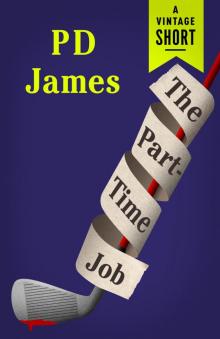 The Part-Time Job
The Part-Time Job Death in Holy Orders
Death in Holy Orders The Victim
The Victim Shroud for a Nightingale
Shroud for a Nightingale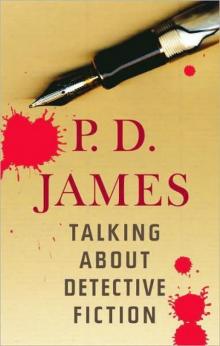 Talking about Detective Fiction
Talking about Detective Fiction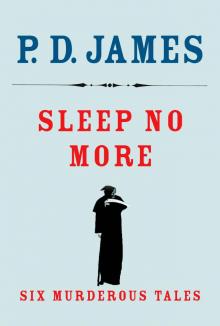 Sleep No More
Sleep No More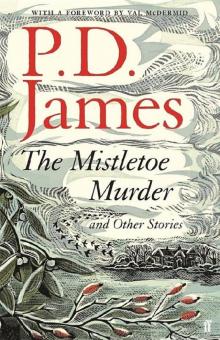 The Mistletoe Murder and Other Stories
The Mistletoe Murder and Other Stories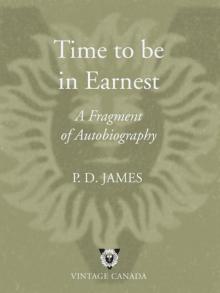 Time to Be in Earnest
Time to Be in Earnest Original Sin
Original Sin A Mind to Murder
A Mind to Murder Cover Her Face
Cover Her Face Innocent Blood
Innocent Blood Devices and Desires
Devices and Desires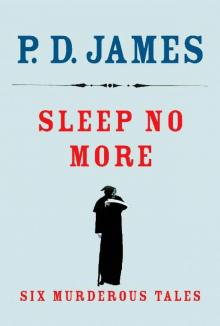 Sleep No More: Six Murderous Tales
Sleep No More: Six Murderous Tales Death Comes to Pemberley
Death Comes to Pemberley The Mistletoe Murder
The Mistletoe Murder Death of an Expert Witness
Death of an Expert Witness The Private Patient
The Private Patient The Black Tower
The Black Tower Devices & Desires - Dalgleish 08
Devices & Desires - Dalgleish 08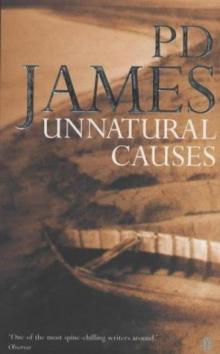 Unnatural Causes
Unnatural Causes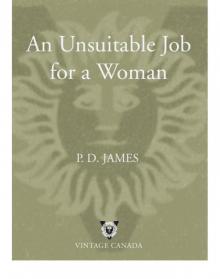 An Unsuitable Job for a Woman
An Unsuitable Job for a Woman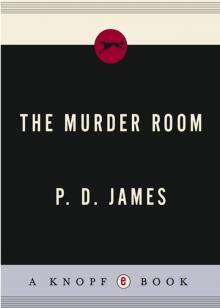 The Murder Room
The Murder Room A Certain Justice
A Certain Justice The Lighthouse
The Lighthouse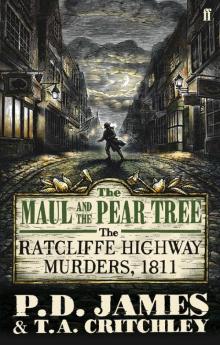 The Maul and the Pear Tree
The Maul and the Pear Tree